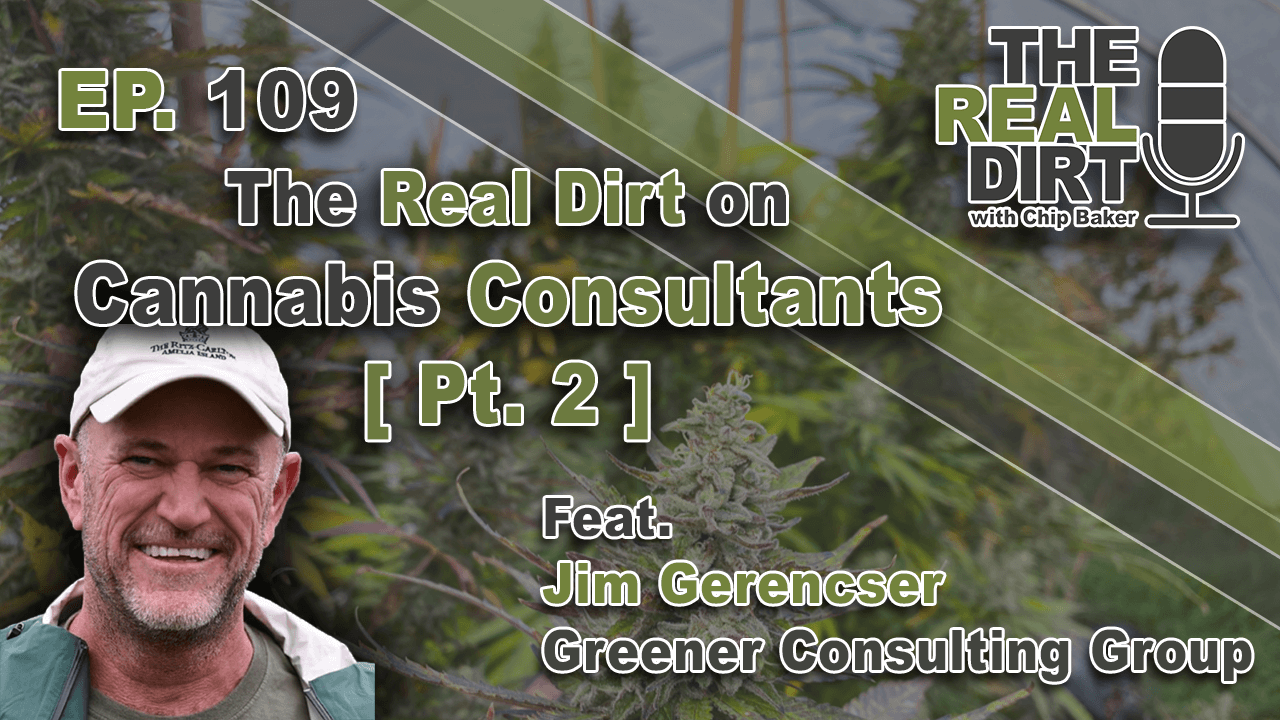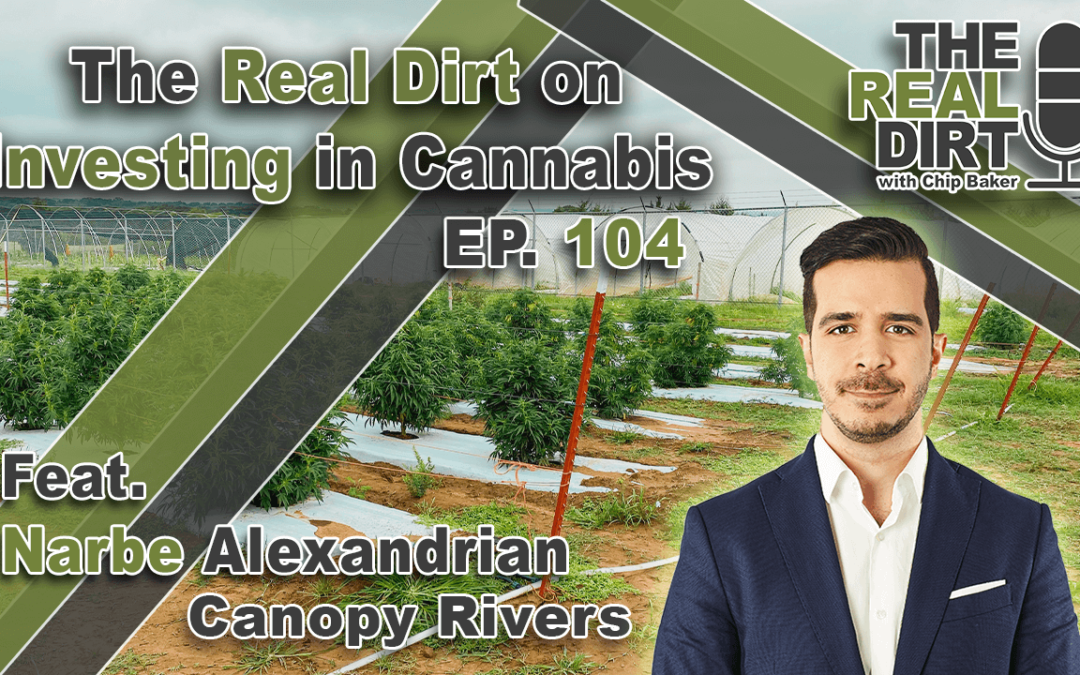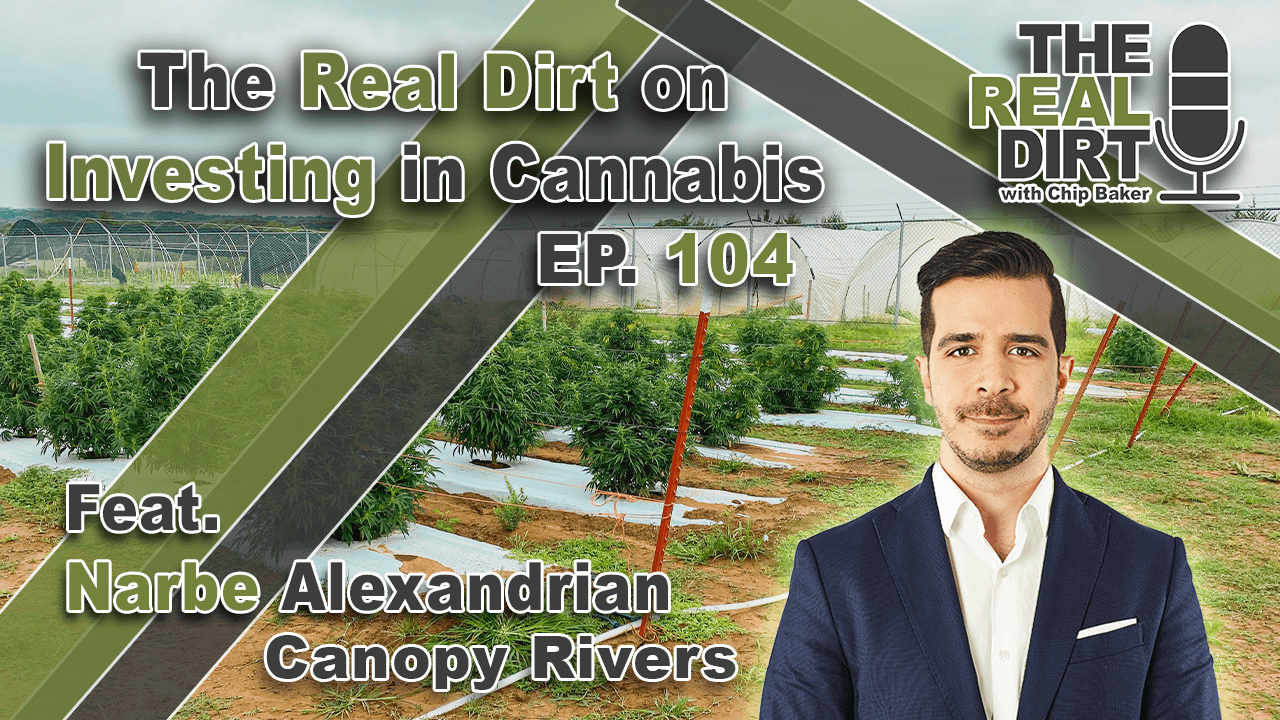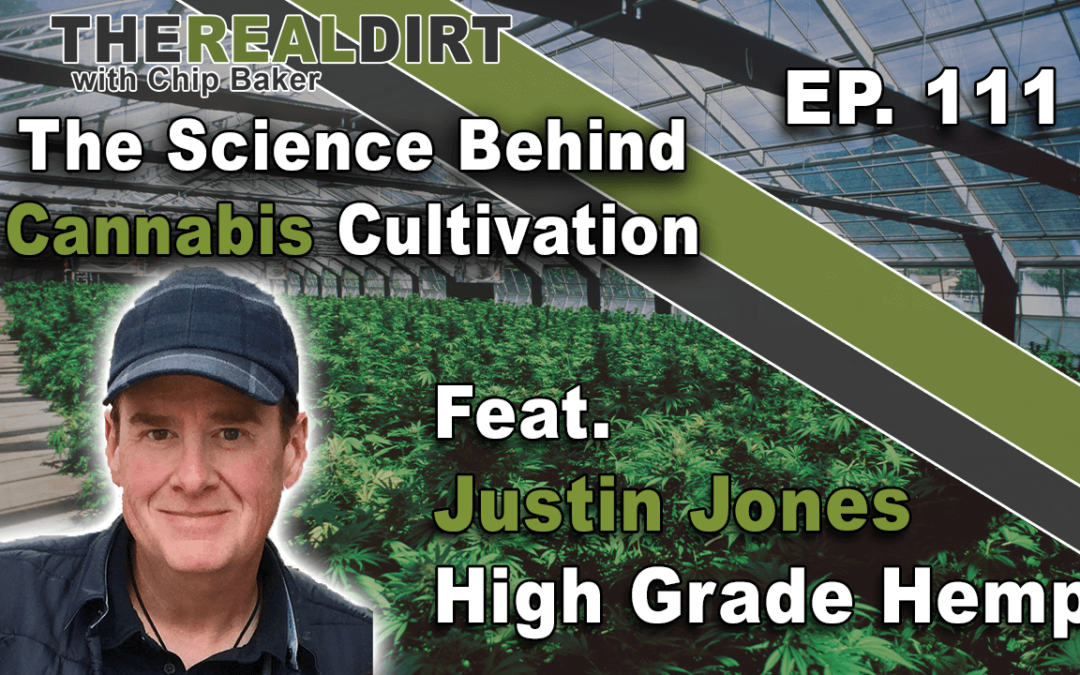
The Science of Breeding Triploid Cannabis
Podcast: Play in new window | Embed
Subscribe: Google Podcasts | Spotify | iHeartRadio | Stitcher | Email | TuneIn | RSS
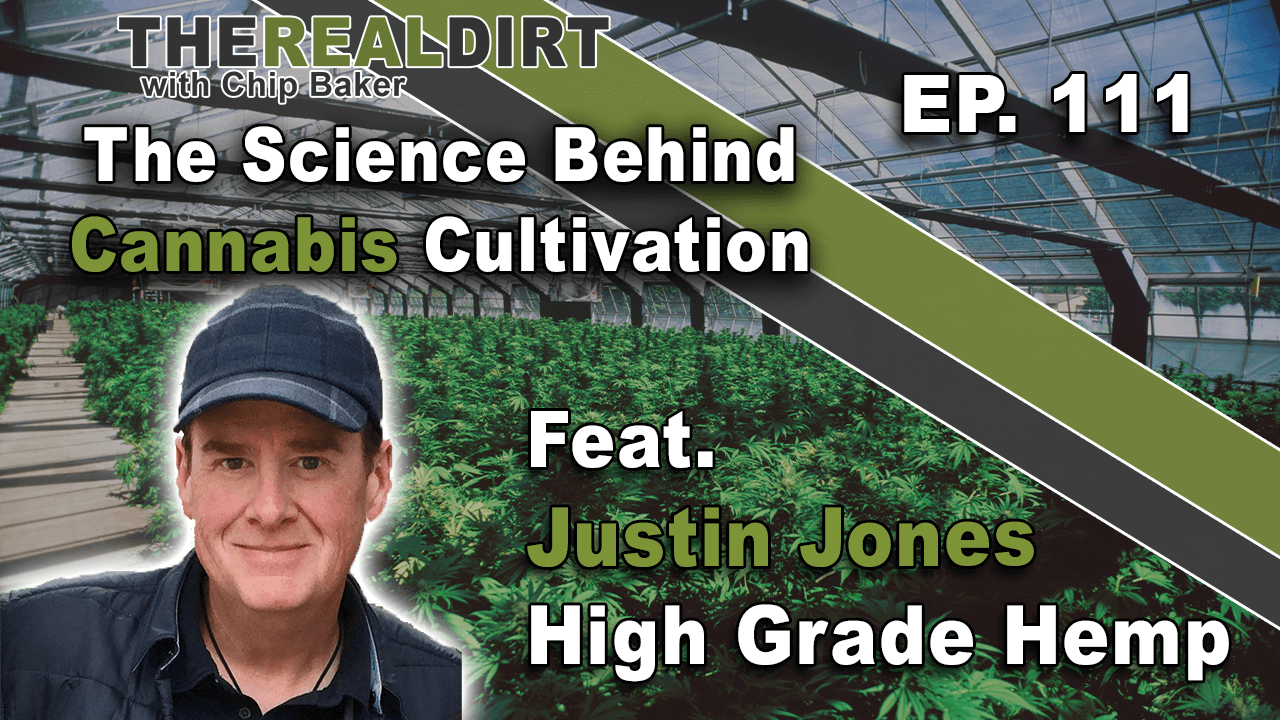
Justin Jones has been in the cannabis industry since the very beginning.
He opened the first ever recreational cannabis dispensary in Colorado, Dank Dispensary in Denver. Justin has been a leader in the legal cannabis industry for close to a decade, and now he’s taking over the hemp industry too.
It’s not so simple for most to transition from traditional cannabis cultivation to hemp cultivation. When you know the science of the plant and how to cultivate it to get the results you want, you can create some incredible strains and genetics.
The evolving science of cannabis and hemp cultivation
Justin made his transition from cannabis to hemp when the Farm Bill passed in 2018, making hemp legal at the federal level. This legalization has given farmers and researchers the resources they need to study hemp more thoroughly without government intervention.
Through his research Justin has been able to develop triploid hemp plants, or sterile male plants put simply. Traditionally hemp and cannabis are diploid plants which means that a male can pollinate a female and produce seeds.
But diploid and triploids are just the tip of the iceberg when it comes to science of cannabis cultivation.
Plant science, patents and more
In this episode of The Real Dirt with Chip Baker, Justin and Chip get into the real dirt of cannabis science and how changing techniques are producing stronger, better cannabis and hemp strains and what that means for the future of the industry.
Roll it up, spark it up and check out this episode of The Real Dirt Podcast!
Follow Dank Dispensary and High Grade Hemp
Dank Dispensary
High Grade Hemp
Follow and Subscribe to The Real Dirt Podcast:
Apple Podcasts
Spotify
Get great deals on grow gear:
CultivateColorado.com
Transcript
Chip: Hey, this is The Real Dirt podcast. I’m here with Justin Jones today, Real Dirt, Sunday morning dirt. How you doing, Justin?
Justin: I’m good. I’m good, Chip. Just got the sun peeking out here coming up, gonna have a nice rainy day here in Oregon. It helped tamp out some of these fires that we’ve had, to help wrap up the end of the harvest here, end of the year.
Chip: Yeah, man, we’ve hit the dry season down here in Oklahoma. The fall and winter are drier, that’s when we have our fire seasons. It’s almost perfect for harvesting cannabis, because it just starts to get dry around first of October. So if you’re lucky enough to be harvesting in October, November, December, those are really good months for you down here.
Justin: We call those fine finishing days.
Chip: Fine, there’s fine finishing days. And if you’re finishing in the next 10 days here in Oklahoma, which many people are, wow man, you’re gonna do really well.
Justin: That’s good. I just was talking to some friends up in western Colorado and they were finishing everything over there and pulling it down out in the Paonia areas. Good value for grown cannabis there in Colorado, maybe the only real value for growing out there in Colorado.
Chip: We’ve had a couple opportunities to move down to Paonia. I wish I could have more time to explore that during our time in Colorado. You know, Paonia was the first like, namebrand weed I would ever, I ever heard of.
Justin: They had a purple or something back in the day.
Chip: Oh, yeah, yeah. Paonia Purple. Peabuds, peabuds.
Justin: That was the pea bud, yeah. And they lost it, nobody’s got it. Some people claim they still, but no one’s seen it for a long time.
Chip: Yeah, you know, that’s what happens with a lot of the famous strains. That’s why like, I call bullshit on anybody wanting to harvest I mean, hold on to their strains. Few people have the overall impact to make a strain happen. And the only way that it happens is through volume of buds produced. And few people can drive that demand, you know what I mean?
Justin: I totally do. And you know, as far as that goes, Matt Deckel, good friend of ours told me about this a while back. Years ago, we started doing that. And so you know, our favorite strains, we don’t just keep them and try to hoard them. We kind of to pair them, let other people enjoy them, and then also backup your cuts. So if you get a bad bug infestation, and you got to [inaudible 2:33] some stuff, or somebody kills your plants, or you know, there’s lots of things can happen. And this way you can start over, and go get your, go get your favorite strains back in your library. So got to back that up.
Chip: Of course, you got to hold on to them. I guess my real, my question is or point is, do you have a strain that’s been a popular, long standing strain in your shop?
Justin: For sure. We definitely do.
Chip: What is it? What is it?
Justin: I would say we’ve got a Chemdog, we had a Chem before that we’ve had for 10 years. It always sells, everybody loves it. We’ve got one of the old school, old school Sour Diesel strains –
Chip: Is that the original, because –
Justin: Yeah, the original for sure.
Chip: Here’s my point, is you’ve got Chemdog and Sour D. And people come there and buy it at Dayton, Colorado. Do you think they would be as possible if there weren’t millions of other pounds of Chemdog and Sour D being grown in the past 20 years?
Justin: I think that that’s, plays a major role. And I think that strains because where we’ve come from and where we still are in most places, but where we’re coming from and moving towards with legalization, people at least now know that they’re getting something that’s repeatable. And so you know, back in the day it gets, and that’s where Chemdog came from, right? Somebody bought an ounce of weed at a Grateful Dead concert. There was 10 seeds in the bag. It was the best pot they ever smoked, they had the seeds, they started planting them, right? And so, they don’t really know what that cannabis was. You have no idea you know, you’d sell whatever they said on the street when you bought it and –
Chip: It was kind [inaudible 4:16] back then. Back then it was –
Justin: KD, yeah. It was just KD, it was just nine Mexican bud. And you know, at the end of the day, now we have, can enjoy the fact that you can say this is Chemdog Four. And then, you can grow it. You can grow it the same way every time and put it out there. And so people that like it that can go and buy it, and get the same thing. And if they’re, you know I, it was really dawned on me about 10 years ago when I started my medical marijuana company in Denver. I had a patient with Crohn’s, really bad Crohn’s. And he told me one time, “The worst thing about Crohn’s is that I’ll find some cannabis that works and it literally will cure my Crohn’s, but I have no idea what it is. I bought it on the street. I don’t know what strain it is.” They could, it could be the name they said or not. And he said, “It’s almost worse for me to find the bag that like, cures my Crohn’s, because I know I’m going to run out and I can’t go get the same stuff again.” For us back then, the Durbin poison that we grew, and we still grow, it was a cure for him. And all of a sudden this guy’s like, “Well, I can get the same thing every month, cures my Crohn’s, and now I’m not so stressed out about finding the right medical cannabis.”
Chip: Man, and Chemdog’s not the easiest one to grow either. To make it consistent and look great, it’s not easy.
Justin: Not necessarily. I think it’s easier than some of the other gassy strains that we’ve seen come out of the skunk lines. But where did the Skunk No. 1 go? That’s what I want to know.
Chip: Oh man, you know, you can still get it. I mean, I bought some seeds several years ago from Sensi Seeds, it’s still, you can get it. It’s still there. I mean, the European Skunk one is.
Justin: Well, the real answer to that question is that it’s everywhere, because it was used in pretty much all the background breeding going on for the last 30 years. So, if you look at the data on strains, pretty much everything that’s got any gas to it’s coming out of Skunk somewhere.
Chip: Yeah, you know, I’ve grown these perfect Diesel buds in the past and I’ve also grown a fair amount of Skunk 1 and Super Skunk. And the Diesel really does have a Super Skunk look, that’s for sure.
Justin: We’re in the world of hybrids now, you know? So, it’s, you never know.
Chip: Well, they’re all hybrids, man. You know, it’s a big conversation we’ve been having about indica, and sativa, and hybrids and we just call it all hybrids now. We’re never going to convince people that cannabis sativa is just hemp and that cannabis with THC in it is indica. Oh, I shouldn’t say never. It’s going to take a few years before people like, start talking, stop talking about cannabis in terms of indica and sativa.
Justin: Well, and as we get some more science involved, I think that’ll help, where the hemp industry is seeing some help from real science, or university science. I just tested a bunch of new hybrids that we’re working on in the hemp side of things. You know, I’m able to take those cannabis samples right over to Oregon State University, drop the leaf samples off, get the test that I need to get done. And you know, that was not available before, you know, a year and a half ago, and really a year ago. And so, it’s still mostly unavailable to marijuana growers, but it’s coming, you know? And as we move along with legalization, I think that we’ll be able to get the science and the real agricultural science guys, those that’ll become something we can use in the cannabis and the marijuana side of cannabis as we are now starting to in the hemp. But that also says, “Hey, what’s going to happen to these marijuana genetics over the next few years if that kind of science becomes more available? And what are we going to see, are the strains going to get better?” Right now there’s a bunch of hemp breeding going on where you’re taking and making triploid hemp plants, and the vigor and the production on these plants is 20 to 40% more than their same diploid siblings. And so what’s that mean, when you kind of start changing the science on the breeding? And using modern techniques, and really not even the modern techniques, just using the traditional plant breeding techniques?
Chip: Yeah, I mean –
Justin: To get better plants?
Chip: Diploid, it’s been around for a minute. I mean, people have talked about this for a bit, diploid, triploid. Why don’t you explain that? You’ve been doing a little bit of this with hemp?
Justin: Right, right.
Chip: I’ve heard, it’s read about the amount of time. David Clark’s book, Marijuana Botany, I think. It was written in the 70s. So it’s not new science.
Justin: No, no, this is not new. And you know, this is not also not necessarily considered GMO either. And that’s another conversation that now we’ve had to have in the hemp industry. Is your hybrid GMO? And is the techniques that we use to feminize seeds in the hemp industry a GMO process or not? And so that’s, and there’s another whole, a whole section of talking.
Chip: Do you have, is there a thirty second disclaimer you have for GMO?
Justin: Well, I mean, GMO doesn’t necessarily mean it’s bad. And you know, there’s obviously people or companies that have used GMO in what I’d like to say a Dr. Evil and I’ll put my pinky in the corner by mouth. You know, if you use GMO to spray poison on plants that won’t kill them and it’ll kill the weeds, then you know, that’s maybe kind of Dr. Evil-ish. But GMO, the GMO process has also done some amazing things for us like anybody that you know that’s a type two diabetic that’s got an insulin dependent thing going on, GMO’s the reason those guys can live a fairly normal life. That’s where they’ve found those, that medicine. So anyways, back to the cannabis side of things on the hemp, you know, what we’re seeing is, you know, lots of different breeding techniques. And so all of a sudden, we can get a triploid and what are the triploids? So your standard cannabis plant is diploid, diploid, diploid, I don’t know, I’m not a scientist, I’m a stoner. So you have a diploid patch. What you do to make a triploid, which the reason we’re trying to make triploids is because they are a sterile plant that will not get the seed, so they are not able to be impregnated by pollen and create a seed. And on the same side of things, you’re also hoping that the pollen that would be produced from those plants might not work to inspect another plant to create –
Chip: Sterile, sterile male?
Justin: Yes. And so, and even if you get a, even if you get a hermaphrodite –
Chip: They do this with other crops, right? Like,
Justin: Well, this is revolutionary for hops. One of the big reasons that the beer industry has gotten just insane in the last 30 years, just because they came up with the seed was hops. I think it was in the Willamette hops from here in Oregon, where the, it was the first variety of seedless. And what that allowed the farmer to do is push the crop out and harvest it when it’s truly ready, and at its full potential. But in hops to do that, you’re risking it going to seed and if your hops go to seed, you get like, a dime on the dollar, okay? So the seedless hops allowed the hops farmer to get bigger production, bigger, you know, more hops per acre and better hops, without accidentally screwing it up and blending. So –
Chip: And this started in the 50’s, 60’s, do you know?
Justin: No, I think the first seedless hops that came out of Oregon State and it was, I think it was more like closer to the 80, early 80’s. So the seedless hops was something that came out of Oregon State and Oregon State developed that original Willamette, I believe, the Willamette hops. And they made that available through the public as you know, the fact that Oregon State’s a land grant university. And so that allowed other hops breeders to go and start breeding projects to seedless. Anyways, what you do here with hemp is, we’re going for this triploid so that we don’t have seeds in the crop. And that way, you can grow whatever you want on your plot of land. And I can be right across the street and I can still grow some [inaudible 12:55] essential oil cannabis for CBD or CBG production, these sort of things. And so, you know, as the industry matures, that’s going to become something that we want to see. And even if you’re in the Midwest, where there’s a lot of rogue hemp, and rogue male cannabis plants, you could still grow seedless oil crop, right? Right. But it takes a long time and you know, you can’t skirt the fact that it just takes a certain amount of days to grow plants out, and then cross breed them, and then grow them back out, and test them, and check them, and regrow, test them and test them and you know, all these things. So, I’ve been working on that now.
Chip: And the flowers there is, they do have, or reported to, reportedly to be larger and more vigorous triploid cannabis, right? Correct?
Justin: Yes, the plants we’re seeing, even if we just look at them from early stage, bigger, it’s just unbelievable. Then I’m hearing 30 to 40% more production, save your buds, less flowers, less leaves, more this, and your ratio of a usable commodity off of a plant versus you know, on a triploid looks like you’re gonna have a lot more sellable weed.
Chip: Yeah, absolutely.
Justin: And you have no seeds in there, so you know, nobody wants to process seeds, because it does something weird to the oil. And then they have to go through it and remediate that. So basically, you know, as a farmer, you’re trying to produce the best material for the person that wants to buy it. And so, in the past, we’ve kind of been like, “Any material produced is fine, because there’s not enough.” Now, we’re getting to like, “Who’s going to produce the best material? What farmers are going to grow it, and then get it into the right form?” And if you don’t have to deal with seeds, and if you’ve got 30% more flower mass over your stems, all these things are exactly what we need the plants to do. But we’re also going to hopefully start seeing this creep into the marijuana side of things. And as I think as some of the genetics, cannabis genetics hemp guys are looking at, how can we start to look at this over at the marijuana side also? So that when we do get a lab, when we can go get on a flow spectrometer machines and test the ploidy level of a plant, and see if it’s a diploid or a tetraploid, or a triploid. You know, we’re gonna see this enter over into the marijuana thing. And maybe some of these old genetics that start to delve out over time from clonal, from over cloning and just being, you know, in that world, we can revive some of these things. And then, you know, again, you know, is it GMO, isn’t it GMO? I mean, you know, truthfully, if you’re not using marker assisted breeding, you know, I’m looking at it that way, you’re still using it, you’re still using your brain, and your eyes, and your nose to –
Chip: Map. Map.
Justin: Yeah, to select strains or select –
Chip: And that’s traditional breeding, right?
Justin: Right, right.
Chip: Hey, man, this summer, we grew a bunch of autoflowers, you know. This is my first like, big autoflower year. We planted out cumulatively about 20,000 autoflower seeds this year, all different types, all bunch of different vendors. And man, I’ll tell you, we got some product from Mephisto Genetics, Three Bears, OG, and they don’t pay me to say any of this, guys [inaudible 16:28]. But we all, everyone who saw this plant were like, “Wow, that’s like genetically modified weed? Like, what the fuck is that?” Because, you know, one, like in 65 days, it’s done. But there’s literally no leaf on these flowers. It’s the perfect cannabis for extraction. It was all bred with traditional techniques. And I mean, 20 years ago, I saw a big bud that looked very similar, right? These huge buds with just a little bit of leaf on them, you know? And that was bred traditionally, as well. That was straight [inaudible 17:06] seed’s product and now they’re Skunk product. But you don’t have to have genetically modified, or use genetically modified technology to breed superior cannabis. You can use science, our current observations with plants, math, additional techniques, all of these things have worked for hundreds of years.
Justin: And even the work that we’ve been doing in the last year, you can really, you don’t necessarily need the university level agricultural science lab, but it makes things faster and better. And here’s the example. When you’re looking for tetraploids, and you’re doing a pheno hunt, but you’re looking for a tetraploid, not a diploid, you look at the size of the stomata, and the shape of the stomata on the leaf. So if you use a nice microscope, like a $200 microscope these days, and these are all, all these microscopes plugged right into your computer, and you can go in and capture your screenshots and look at things.
Chip: Oh sick, man, we just got one. Like, I was gonna get one for the clone nursery, so anybody can look at any of the clones or any of the weed, make sure there’s no mold or mildew or PM or any bug, or anything. It’s right there on the counter, $200.
Justin: Great, yeah, look at it. And so what we’re doing, is we’re actually taking and looking at the size, and measuring the size and the shape of the stomata to see, and that can tell us what the ploidy is on it, okay? So when you’re hunting for a tetraploid, you’re looking for a different, a less round stomata, and also the size of stomata is bigger. And so –
Chip: Like how, that’s two, three times bigger, you know, how much bigger?
Justin: From what we were working on, the microscope that we had was measuring in pixels. And I don’t even know what, we don’t even give a shit what that prize is. Because what we are doing to say, “Okay, this is a, this has this stomata is 70 pixels. This is 80. This one’s 100. This one’s 110, this one’s 60.” And what we’re looking at, first of all, we’re looking at stomatas that don’t have a perfectly round shape, first of all. That’s a first indicator that it could be a tetraploid. The problem is most of it falls in the 70 to 90 zone, okay? And so you know, you start to, so what we would do is we would use the microscope to get a bunch of the work done, and to measure and know. And then we would send all those samples to the lab and find out, yeah, that is not a tetraploid. That is maybe a tetraploid. That is a tetraploid. And then you know, then you get that data back and you start to say, “Okay, I can probably guarantee anything above these 90 pixels is a tetraploid.” But when you’re breeding and you don’t, you know, and you can’t get back the time that it takes. You want to know for sure. So you don’t waste six months on something that turns out, you’re wrong. And so, you get your tetraploid stock and then you start breeding with those plants. And I guess in layman’s terms, they have six sets of DNA. That’s why is it tetraploid, and then a diploid has two. And so, when you hybrid the two, six divided by two becomes three and that’s your triploid. And then those because of the three sets, DNA cannot make babies. Collect the donkey and the horse, make a mule, right? But then a mule can never replicate, the mules are optional.
Chip: Oh, the mule cannabis, Justin Jones, we’re talking about genetics, random other thing, but mostly –
Justin: Yeah, well, I finally got that –
Chip: It’s all about the ganja.
Justin: I finally got that ganja rolled up here for the Sunday morning smokedown but –
Chip: Oh, what are you smoking? What are you smoking on?
Justin: Sherbadough from Archive.
Chip: Sherbadough, that’s Sherbert and Do-Si-Do, right?
Justin: Yeah, you know, the boys are like, “I’d love to hit that, hit everything with the Do-Si-Do.”
Chip: Oh, yeah. I just planted out a huge pheno selection of Archive Do-Si-Do crosses, Fletcher over there’s got always running some R&D. And he had a new Do-Si-Do male or a new Do-Si-Do donor he was using for his feminized line. And these guys, Sherbert Do-Si crossed with Do-Si-Do. Diesel, OG Face Off, T-1000, Tangie, Lemon G, Skittles all crossed with the, that new Do-Si-Do donor. So we’re excited about it, they look great.
Justin: That’s good. I’m sitting here, I’ve got, I’m talking about you know, breeding and hybrids. I’ve got a Gorilla Glue 4 here from Archive that I grew. And then I also have a Duct Tape, which is Gorilla Glue 4 divided by the Do-Si-Do. And so to see like just the pure Gorilla Glue 4, and then right next to it, you know, it’s sister, or, you know, half sister, whatever, whatever with the Do-Si-Do. They’re very similar, but yet very different on the terpene profile. That Do-Si-Do gives everything just a little something I don’t know, that’s more magical. It’s different, it’s better.
Chip: It’s bigger. It’s bigger, for sure. It is better. And yeah, I’m really excited about it, man. You know, we’ve planted out of 2,500 of those seeds, and I’m going to have an incredible Do-Si-Do out of it all. I’ll be able to pick the Do-Si-Do. And I’m looking for the hybrids too but, man, it’s exciting just to see it all. That’s for sure. Right now I like the Do-Si-Do Face Off and the Do-Si-Do SFP backcrosses the best. If you think about it, those are almost all just like BX backcrosses, because the Face Off is in the Do-Si-Do. And then cross it back to the Face Off and cross it back to the SFP.
Justin: Well I’ll tell you what. The marijuana breeders right now need to get hip, start trying to work on protecting their IP if they have it. Because that’s going to be the next thing once we get some sort of federal legalization, and guys want to become the next Sierra Nevada of marijuana or the next Two Buck Chuck or whatever. People are going to start going to war over their genetics and I’ve even had conversations with some guys in California that already want to start working on a Mendocino hamlet. And you know, Humboldt hamlet –
Chip: Yeah, the Appalachian, the Appalachian is definitely starting to grow in ideology. Yeah, you know, Calculator right now, famous MAC line. He is upset that clone dealers are dealing his MAC 1 strain. He claims just recently on his Instagram channel that he’s going after some major clone producers in California for selling his MAC 1. I don’t believe he really has any legs to stand on currently, because there’s not going to be a court that’s going to enforce it. And you know, also just because like he claims to own a plant, doesn’t mean he owns anything, right?
Justin: No and it’s going to come down to the processes too. And so, there’s a popular hemp breeder here in Oregon and they’ve already got that patents filed on a bunch of things. And one of their patent pendings is on crossing autoflower genetics into full term photo plants. And so, if that patent gets issued, anybody into choosing that process will have to pay them some money. Maybe, right? I mean, everything has to be, try to be enforced. But at the end of the day, they’re saying that they own the rights to cross a ruderalis with a, you know, cannabis sativa or whatever, and get that early hybrid.
Chip: Yeah, this is Phylos. Phylos –
Justin: No, no, it’s not that one. Were filed that is Oregon CBD.
Chip: Oregon CBD. But Phylos, they have a couple similar, similar thing going on, right?
Justin: Phylos has been collecting data on the different strains of cannabis and trying to relate them to each other to say, “Okay, you have a -“
Chip: Oh, okay. So Phylos was not involved with the autoflower?
Justin: Well, where they could become involved in is to who has the real, true, earliest version of a strain? And so there’s a, you know, let’s just say Jack Herer, okay it’s famous person and also a strain.
Chip: Yep.
Justin: If somebody wants to say, look, in order for you to say that that’s Jack Herer, it’s gotta A, be this, 123. This terpene profile stand, it’s got to be grown in Mendo or in this Hamlet, right? So they’ve done that with wine, obviously. If you grow your grapes in Washington, you can’t call it champagne. You gotta call it spark, white, sparkling, because it didn’t come from France. You’re gonna see that play out. Part of what Phylos is trying to do is they try to find those oldest, earliest grandparent genetics, or who’s got the oldest clone that’s not, you know, whatever. We’ll see. We’ll see how, but there’s already people trying to patent. And I don’t think anybody’s trying to patent Sour Diesel, I think.
Chip: Well, cause if you can patent cannabis sativa strains, you can patent hemp.
Justin: They’re trying to patent the processes to feminize. So if you spray a certain type of silver on your plants, then to get a feminized pollen, and then you’re using that in your breeding, that that would be infringement on their IP. So again –
Chip: Yeah, the plant’s gotta stand up in court and somebody has to enforce them and sure.
Justin: Well sure, but I’m just saying that you know, hemp has become you know, fully legal before marijuana. It’s you’re seeing it already, the –
Chip: Oh, there’s already a patent with hemp. There’s a hemp, or hemp people have already received patents for hemp, right?
Justin: I believe so. I would say probably yes, but –
Chip: Charles Webb. Those guys, they got a patent. They were the first people to get a patent.
Justin: Probably.
Chip: Yeah, totally. I’m sure others have by now. It’s a little weird thing to do, but yeah, go file for a patent if you think you got special shit. Then go sue everybody who uses your special shit without your permission. I guess that would do it, right? Mostly, I don’t really have special shit, though. It’s just normal weed that’s hype.
Justin: Well, it comes down to this. The best advice I could give any of these breeders and I’m not a breeder, we’re messing around with some stuff for fun. And maybe it turns out to be something, you know –
Chip: We’re messing around with stuff for fun. How many seeds you got in your seed vault right now? Can you count?
Justin: I don’t know. A couple hundred, 300. You know, at the end of the day though, what I you know, the people that have been breeding in the marijuana side of things, you know, whether you’re the guys that wear the funny sunglasses and the fake mustaches at the Emerald cup, or not, because you’re trying to not necessarily be above you know, or be out in the public eye. You’ve gotta start getting into the science and you gotta team up with somebody with some sort of trust. Well, if you don’t go the bioscience routes, you’ll wake up and realize that the guys that did go that route, and jump you, and go five years ahead of you in a short amount of time. You can be scared of that, and I’ve seen them be scared of going that direction because of you know, just that Dr. Evil science side of things. But boy, a lot of knowledge out there that’s never been applied to cannabis from you know, from our modern world of agriculture. So yeah, find some science buddies if you’re out there breeding and, you know, try to figure out how to do all these things. Because even just getting your genetics into a tissue culture lab, you know, and having them clean them up and do all these things, that can take like up to a year.
Chip: Yeah, no shit. Right.
Justin: And so you can’t you know, if you wait too long, and then say, “Hey, we really do need to take this clone that we’ve been using forever and get it cleaned.” It takes a while. So in California, I think there’s a lot of bioscience companies and people are starting to jump in on the marijuana side of things. But until it’s federally legal, you really won’t get the doors opened all the way. But those who have already started something will be ahead.
Chip: Well, it’s been another fine episode with Justin Jones. Thanks for joining us, Justin.
Justin: Yeah, thank you, Chip. Great talking to you. We got off on some tangents there with the genetics and other things, but that was fun. And we’ll circle back and produce more sense of that some other day.
Chip: Yeah, absolutely. If you’re like this episode, or interested in others, please download it at the iTunes. We are The Real Dirt podcast. Also look us up on Spotify, and you can check us out therealdirt.com Hey, remember, if you’re ever looking for soil or soilless growing mediums, check out growerscoco.com, ask for them in your local store. And if you’re cruising online one day interested in buying some hydroponic or indoor supplies, look at cultivatecolorado.com. This has been The Real Dirt. Love y’all.
Podcast: Play in new window | Embed
Subscribe: Google Podcasts | Spotify | iHeartRadio | Stitcher | Email | TuneIn | RSS

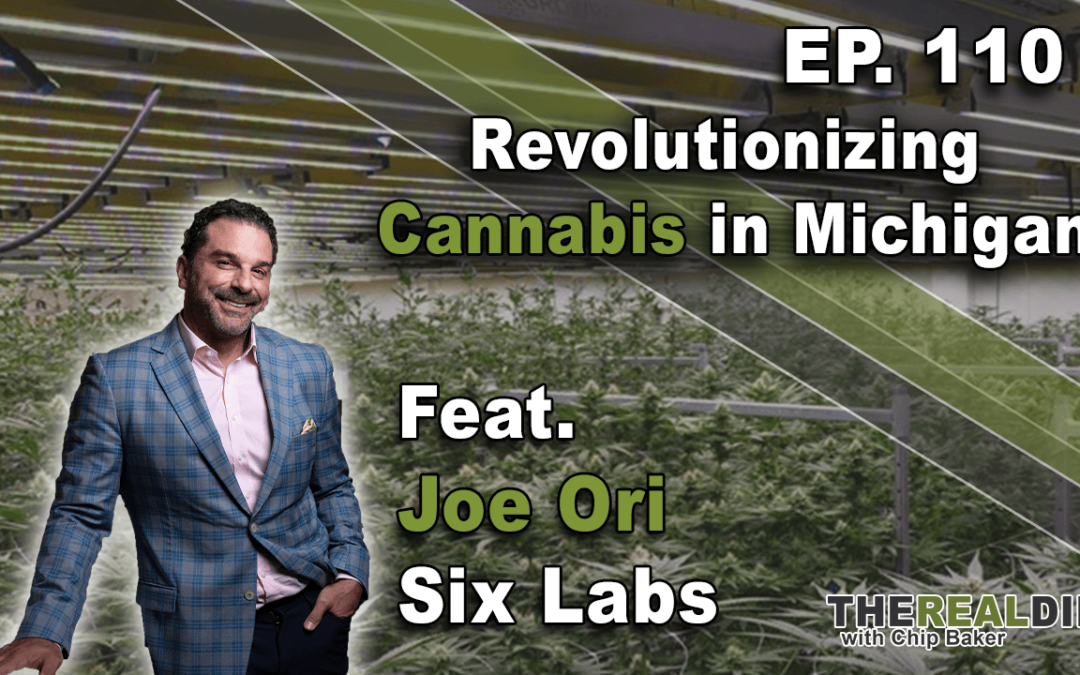
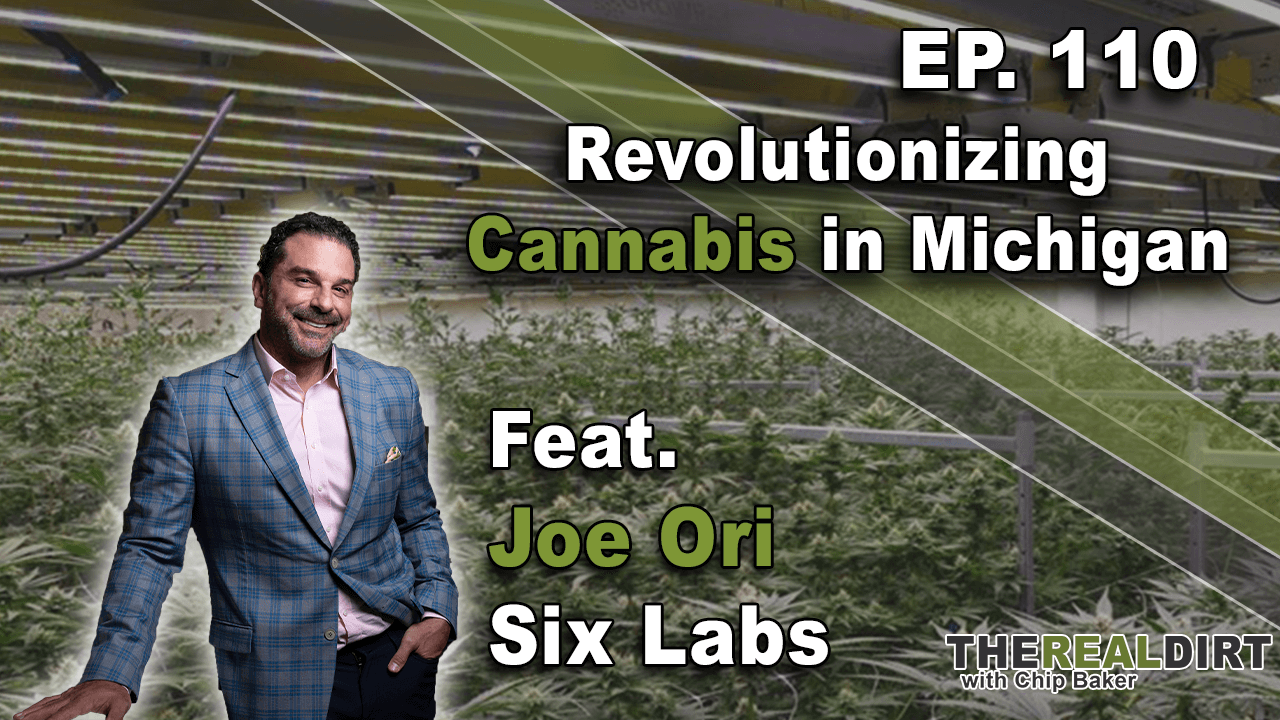
![Cancer, Cannabis and Cultivation [ Jim Gerencser Pt. 2 ]](https://therealdirt.com/wp-content/uploads/2020/10/Jimpt2YouTube-Thumbnail-1080x675.png)
